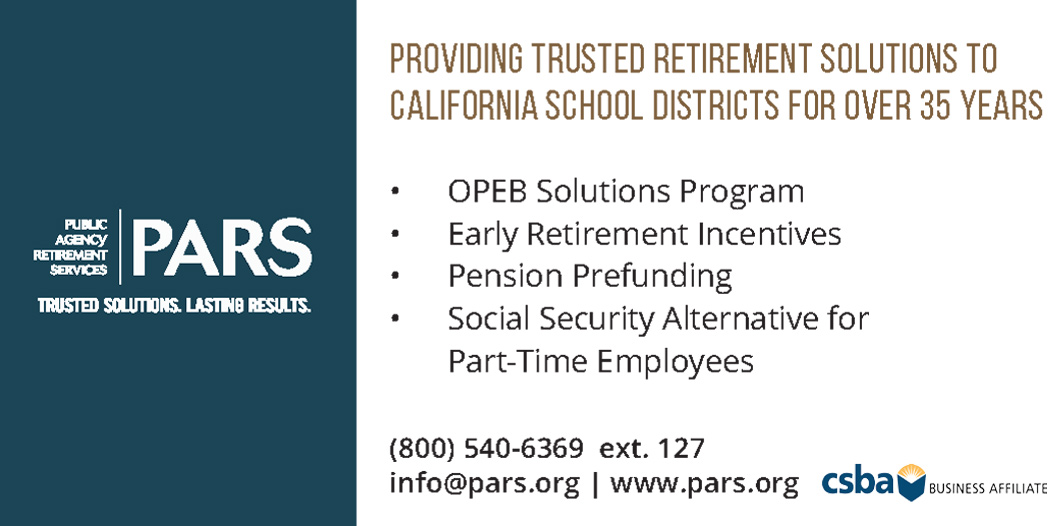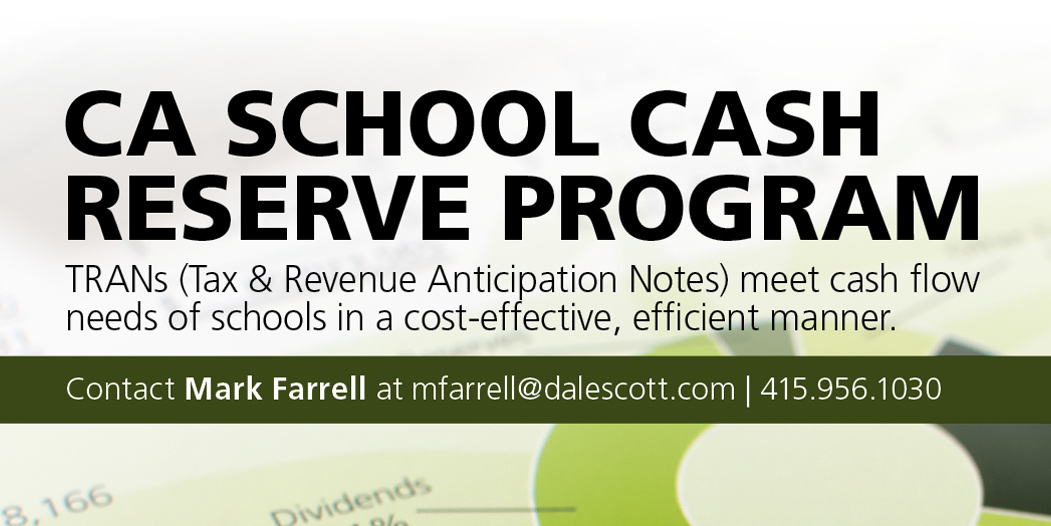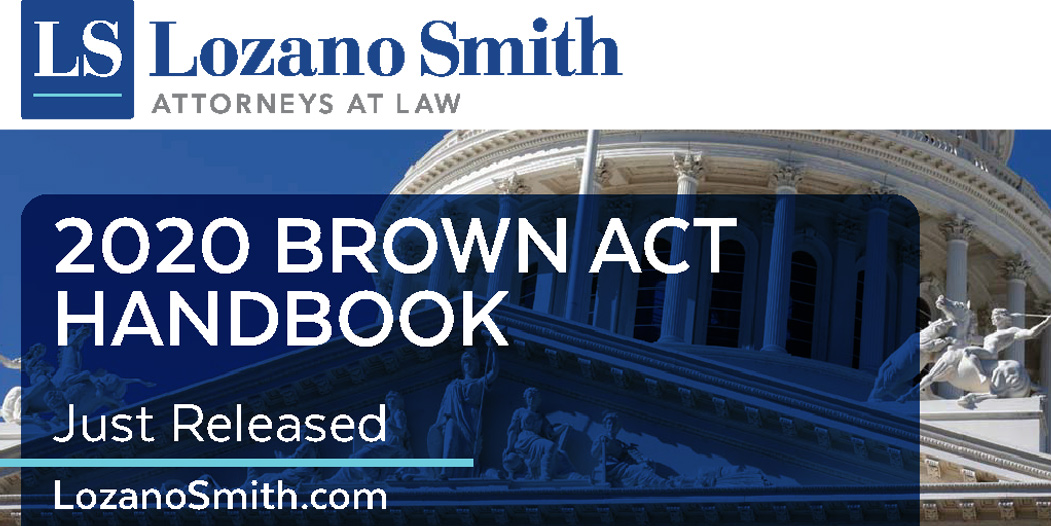

On March 17, the California Department of Education released extensive guidance for schools that have closed due to COVID-19. In a webinar, CDE representatives said that the CDE would send updates every Friday and update the guidance as needed. The guidance is divided into three sections: distance learning, school meals, and child care and student supervision, and can be found on the CDE website at www.cde.ca.gov/ls/he/hn/guidance.asp.
CSBA will be keeping members up to date through individual eblasts when pertinent information becomes available, our weekly update email, a daily education news roundup email and through a dedicated page online at www.csba.org/coronavirus.
- Visit www.csba.org/Newsroom for links to digital versions of current and past issues of California School News.


Government Code section 54954.2, subdivision (a)(3), allows board members or staff to briefly address items that are not on the agenda, but these limited exceptions do not allow the board to fully discuss and/or act upon a matter. These limited exceptions are as follows:
- Members of the board or staff may briefly respond to statements made or questions posed during public comments.
- The board may ask staff members to report back to the board on a matter and to place the matter on the agenda for a future board meeting.

Senior Director of Communications:
Troy Flint | tflint@csba.org
Managing Editor:
Kimberly Sellery | ksellery@csba.org
Marketing Director:
Serina Pruitt | spruitt@csba.org
Staff Writers and Contributors:
Andrew Cummins | acummins@csba.org
Alisha Kirby | akirby@csba.org
Aaron Davis | adavis@csba.org
Mike Ambrose | mambrose@csba.org
Briana Mullen | bmullen@csba.org
Graphic Design Manager:
Kerry Macklin | kmacklin@csba.org
Senior Graphic Designer:
Mauricio Miranda | mmiranda@csba.org
Xilonin Cruz-Gonzalez | Azusa USD
President-elect:
Suzanne Kitchens | Pleasant Valley SD
Vice President:
Susan Heredia | Natomas USD
Immediate Past President:
Emma Turner | La Mesa-Spring Valley SD
CEO & Executive Director:
Vernon M. Billy
California School News (ISSN 1091-1715) is published 11 times per year by the California School Boards Association, Inc., 3251 Beacon Blvd., West Sacramento, CA 95691. 916-371-4691. $4 of CSBA annual membership dues is for the subscription to California School News. The subscription rate for each CSBA nonmember is $35. Periodicals postage paid at West Sacramento, CA and at additional mailing office. POSTMASTER: Send address changes to California School News, 3251 Beacon Blvd., West Sacramento, CA 95691.
News and feature items submitted for publication are edited for style and space as necessary.


I am writing this message in a time of great uncertainty, not just for public education, but for our everyday lives as we face the coronavirus (COVID-19) pandemic. I want to commend my fellow trustees — as well as administrators, teachers and classified staff — across California for working tirelessly as we strive to educate and serve the state’s 6.2 million students amid unprecedented school closures. The challenges of the moment and those that lie ahead are tremendous, but by working together, we can meet them head on.
Gov. Gavin Newsom issued a stay-at-home order for the entire state of California on March 19, urging residents to shelter in place, avoid nonessential errands and practice social distancing. However, we know that the critical functions of education must go on. Since the onset of coronavirus concerns and even before schools halted in-person instruction, CSBA has been working hard to keep you informed of the latest updates from both state and federal authorities. In addition, we have compiled a comprehensive set of resources (which are being updated as necessary) for California schools grappling with the impact of COVID-19. I hope school communities, students, families and staff find it useful and provide feedback to staff. These resources cover areas including remote and distance learning, student health and well-being, serving students with disabilities and special needs, multilingual education, support for parents and families, meals and nutrition services, and pressing legal issues.

CSBA endorsed Proposition 13 and actively campaigned for its passage alongside other statewide education organizations and advocacy groups, legislators and state officials, including Gov. Gavin Newsom. CSBA staff members and area school board members visited schools with Gov. Newsom in both Northern and Southern California in the final days leading up to the election.
![]() GovernanceCorner Practical tips from our MIG faculty
GovernanceCorner Practical tips from our MIG faculty
A governance calendar provides a framework for the board to keep track of the key responsibilities in the priority areas of the local educational agency. The tool documents critical timelines and allows staff and the board to accurately calendar and prepare for study sessions, progress reports and board action on important topics in a timely manner.
When reviewing this calendar, some of the critical questions to reflect on are:
- How are we currently using our governance leadership calendar? What are ways we could use it more effectively?
- How comprehensive is our calendar? In addition to tracking calendar items such as finance, facilities and collective bargaining, do we use it to track items related to student learning and achievement?

Before adjourning, the Legislature passed a bill package allocating more than $1 billion for the statewide fight against COVID-19, including Senate Bill 117, which appropriates $100 million for California’s schools to combat the spread of the virus and enacts other protections for schools amid their statewide closures. The passage of SB 117, which you can read more about in this newsletter’s cover story, preceded by less than 24 hours Gov. Gavin Newsom’s devastating yet unsurprising prediction that California’s schools are unlikely to reopen before the summer break.
A regular annual update to the State Board of Education at its March 11–12 meeting about the California School Dashboard raised serious questions and concerns from board members about several proposals.
While only an information item, the board informed California Department of Education staff that much more clarity and direction must be provided about the proposed inclusion of a student growth model on the 2020 Dashboard. California is one of only two states that does not measure school performance based on the growth of individual students’ scores on standardized tests over time. A push from many organizations and researchers led the CDE to study growth models over the last year, with CSBA participating in a stakeholder work group.
As the CDE moves forward, State Board member Sue Burr said the state must be “crystal clear” with parents and local educational agencies about what, exactly, the growth model data is conveying about students. For example, she said the model may not necessarily provide valid insights into whether students are prepared to do work at grade level when they cross from elementary school to middle school and middle school to high school.
The 2020 criteria used to evaluate potential officer candidates is as follows:
A CSBA leader:
- Communicates effectively on behalf of public education and, as the face of CSBA, advocates CSBA’s vision, mission and governance structure.
- Demonstrates knowledge of education finance, budget and accountability issues on a statewide basis.
- Understands, articulates and influences the Legislature’s impact on public education.
- Demonstrates advocacy for and knowledge of the diverse needs of all students throughout the state.
- Engages and strengthens the power and voices of local governance teams.
- Demonstrates high standards of ethics and integrity.
- Leads successfully in the face of change and challenges.
- Possesses strong leadership skills, including the ability to collaborate, motivate and inspire.
The second cohort of network participants met at CSBA’s offices in West Sacramento for the final time March 6–7 to discuss the status of their districts’ equity action plans, review what they’ve learned so far and further analyze how they can continue working toward creating equitable opportunities for all students.
CSBA spoke to a handful of participants to discuss what they’ve learned through the Equity Network and their district plans moving forward.

Certificated staff who become National Board Certified teachers by completing this rigorous, advanced certification process can provide valuable expertise and exemplary leadership for school sites. They can act as teacher leaders on school campuses through roles including team leaders, department chairs and instructional coaches.
The initiative — which received a 2019 CSBA Golden Bell Award and the Apple for Excellence Award from California County Boards of Education — provides students, teachers and those in the community the opportunity to learn about other people’s cultures, history and identity by first learning the story behind students’ names.
Though pronouncing another person’s name properly may seem to be a small gesture, making that simple effort can have a major, positive impact on children.





